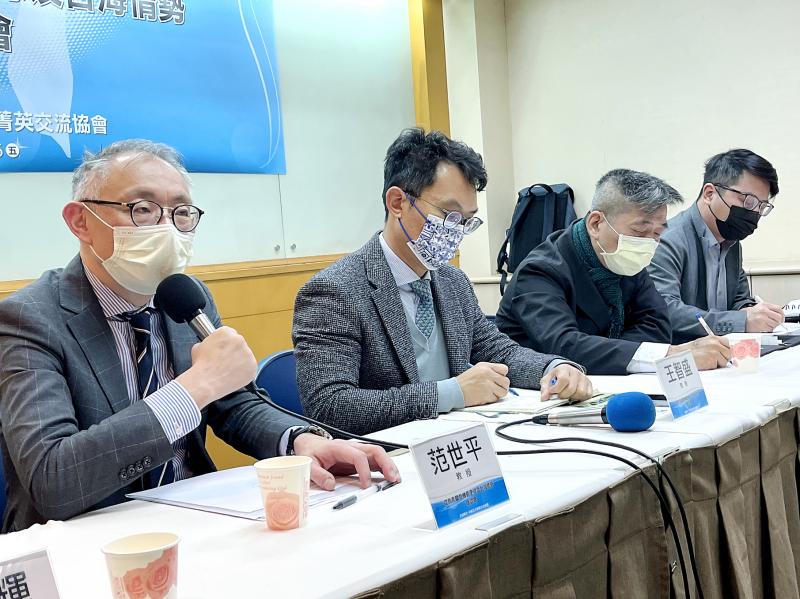Comparing the situations in Taiwan and Ukraine is inappropriate, Taiwanese academics told a forum in Taipei yesterday, highlighting that the conditions the two nations are facing, including their locations as well as their geopolitical and international trade position, are entirely different.
Ukraine has a land border with Russia and is vulnerable to a large-scale land invasion, while Taiwan is separated from China by the Taiwan Strait, Institute for National Defense and Security Research senior analyst Su Tzu-yun (蘇紫雲) told the event hosted by the Association of Chinese Elite Leadership.
Taiwan’s semiconductor industry, which has proven to be critical for global supply chains, and shipping routes to Japan through Taiwanese waters ensure that other countries’ national interests overlap with Taiwan’s, Su said.

Photo: CNA
Meanwhile, the Ukrainian economy is focused on agriculture and traditional industry, he said.
Unlike Taiwan, Ukraine does not occupy a “special place” in US politics, and its strategic value is far less pronounced, National Taiwan Normal University professor Fan Shih-ping (范世平) said.
As Taiwan is part of the first island chain, loosing it to China would endanger Guam, Hawaii and even the US west coast, Fan said.
Taiwan’s semiconductor industry is crucial to the world, so a Chinese invasion would have a far greater effect on global markets, he added.
The Taiwan issue is well-known in the international community, Fan said, citing as examples British Prime Minister Boris Johnson and Australian Prime Minister Scott Morrison mentioning Taiwan when speaking of the Ukraine conflict.
Ukraine became overly reliant on US and NATO promises, as its defense industry fell into disrepair after the 2014 Minsk agreement, he said.
Russia’s goal is regime change in Ukraine, while China’s ambition would be incorporating Taiwan, Cross-Strait Policy Association researcher Wu Se-chih (吳瑟致) said.
Drawing conclusions from the Ukraine conflict is a logical fallacy, Wu said, denying media reports saying that today’s events in Ukraine would be replicated in Taiwan one day.
Private entities should leave it to the government to make such far-reaching statements, he added.

The CIA has a message for Chinese government officials worried about their place in Chinese President Xi Jinping’s (習近平) government: Come work with us. The agency released two Mandarin-language videos on social media on Thursday inviting disgruntled officials to contact the CIA. The recruitment videos posted on YouTube and X racked up more than 5 million views combined in their first day. The outreach comes as CIA Director John Ratcliffe has vowed to boost the agency’s use of intelligence from human sources and its focus on China, which has recently targeted US officials with its own espionage operations. The videos are “aimed at

STEADFAST FRIEND: The bills encourage increased Taiwan-US engagement and address China’s distortion of UN Resolution 2758 to isolate Taiwan internationally The Presidential Office yesterday thanked the US House of Representatives for unanimously passing two Taiwan-related bills highlighting its solid support for Taiwan’s democracy and global participation, and for deepening bilateral relations. One of the bills, the Taiwan Assurance Implementation Act, requires the US Department of State to periodically review its guidelines for engagement with Taiwan, and report to the US Congress on the guidelines and plans to lift self-imposed limitations on US-Taiwan engagement. The other bill is the Taiwan International Solidarity Act, which clarifies that UN Resolution 2758 does not address the issue of the representation of Taiwan or its people in

US Indo-Pacific Commander Admiral Samuel Paparo on Friday expressed concern over the rate at which China is diversifying its military exercises, the Financial Times (FT) reported on Saturday. “The rates of change on the depth and breadth of their exercises is the one non-linear effect that I’ve seen in the last year that wakes me up at night or keeps me up at night,” Paparo was quoted by FT as saying while attending the annual Sedona Forum at the McCain Institute in Arizona. Paparo also expressed concern over the speed with which China was expanding its military. While the US

SHIFT: Taiwan’s better-than-expected first-quarter GDP and signs of weakness in the US have driven global capital back to emerging markets, the central bank head said The central bank yesterday blamed market speculation for the steep rise in the local currency, and urged exporters and financial institutions to stay calm and stop panic sell-offs to avoid hurting their own profitability. The nation’s top monetary policymaker said that it would step in, if necessary, to maintain order and stability in the foreign exchange market. The remarks came as the NT dollar yesterday closed up NT$0.919 to NT$30.145 against the US dollar in Taipei trading, after rising as high as NT$29.59 in intraday trading. The local currency has surged 5.85 percent against the greenback over the past two sessions, central